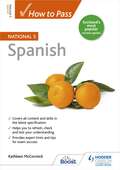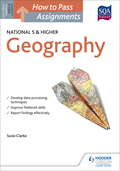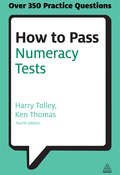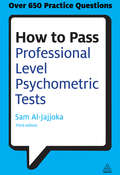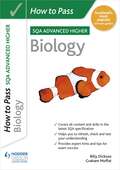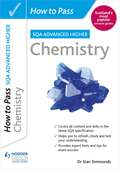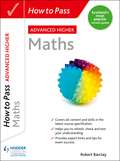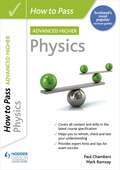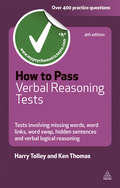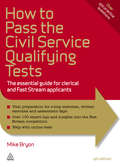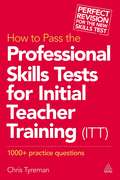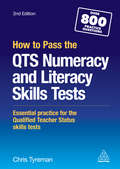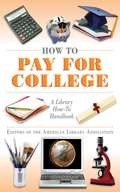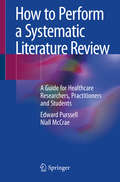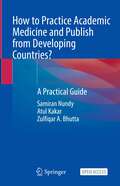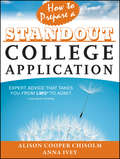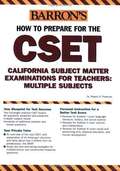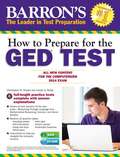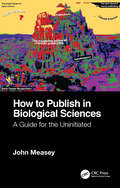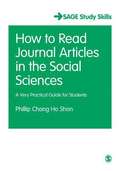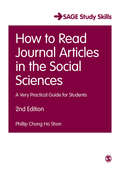- Table View
- List View
How to Pass National 5 Spanish
by Kathleen McCormickTrust Scotland's most popular revision guides to deliver the results you want. The How to Pass series is chosen by students, parents and teachers again and again.This is the only study guide that is structured around the skills of reading, writing, listening and talking, to align closely with the assessments.> Practise, practise, practise. Develop the four key skills as you answer questions across the specified contexts of society, learning, employability and culture.> Read, listen, succeed. All-new text extracts and audio files give you plenty of opportunities to build your understanding of the Spanish language so you can aim for a better grade.> Improve your vocabulary and grammar. 'What you should know' summaries, a vocabulary checklist and a grammar guidance chapter help you to master the basics. > Get expert tips for all assessments. From quick, handy hints to detailed, step-by-step advice on the exam, assignment and performance, this book has everything you need to feel confident and prepared.
How to Pass National 5 Spanish
by Kathleen McCormickTrust Scotland's most popular revision guides to deliver the results you want. The How to Pass series is chosen by students, parents and teachers again and again.This is the only study guide that is structured around the skills of reading, writing, listening and talking, to align closely with the assessments.> Practise, practise, practise. Develop the four key skills as you answer questions across the specified contexts of society, learning, employability and culture.> Read, listen, succeed. All-new text extracts and audio files give you plenty of opportunities to build your understanding of the Spanish language so you can aim for a better grade.> Improve your vocabulary and grammar. 'What you should know' summaries, a vocabulary checklist and a grammar guidance chapter help you to master the basics. > Get expert tips for all assessments. From quick, handy hints to detailed, step-by-step advice on the exam, assignment and performance, this book has everything you need to feel confident and prepared.
How to Pass National 5 and Higher Assignments: Geography
by Susan ClarkeThe perfect guide to the Assignment component at National 5 and Higher.Assignment work at National 5 contributes to 25% of your final grade, and to 33% at Higher. This How to Pass Assignments at National 5 and Higher Geography title offers complete guidance on making your Assignment content and presentation appropriate, including:advice on selecting appropriate topicsresearching this topic at home and in the fieldre-format findings into processed information, before writing them up
How to Pass Numeracy Tests
by Harry Tolley Ken ThomasHow to Pass Numeracy Tests will help you practice for timed tests, revise your maths and numeracy knowledge and improve your test technique. Providing over 350 practice questions it also gives vital advice on how the tests are marked and what you can do to optimise results. The wide variety of practice includes 20 timed tests on data interpretation, number sequences and number problems, covering percentages, averages, currency, decimals, whole numbers, multiplication and division as well as adding and substracting. With mental arithmetic starter exercises and a host of preparation techniques, How to Pass Numeracy Tests will help increase your confidence and beat the competition.
How to Pass Professional Level Psychometric Tests
by Sam Al-JajjokaHow to Pass Professional Level Psychometric Tests contains a wealth of practice questions to help prepare you for exactly the type of tests you will face in recruitment assessments for professional careers. A staggering 650 questions and answers, consisting of 20 timed practice tests reflect real life exams favoured by the most popular organisations. It is particularly useful for those facing aggressive psychometric tests, particularly candidates for careers in IT, management and finance. Also including practice questions for common verbal reasoning and numerical tests, How to Pass Professional Level Psychometric Tests provides essential help and preparation to improve your score and gain the competitive edge over the competition.
How to Pass SQA Advanced Higher Biology
by Graham Moffat Billy DicksonExam board: SQALevel: Advanced HigherSubject: BiologyFirst teaching: August 2019First exam: Summer 2021Trust Scotland's most popular revision guides to deliver the results you want. The How to Pass series is chosen by students, parents and teachers again and again.This is the only study book that addresses the skills for Advanced Higher Biology, as well as the knowledge.> Recap and remember course content. Concise summaries and diagrams cover the important points for each Key Area in the latest SQA specification.> Test your skills and knowledge. Regular 'check-up' questions throughout the text help you to see if a topic is secure before you move on. This style of active revision is much more effective than simply reading.> Practise exam-style questions. Formal questions with mark allocations are provided at the end of each Key Area, reflecting the types of questions you will face in the exam. Three course assessments are also included.> Get expert tips for exam success. Hints on how to achieve top marks and avoid mistakes are based on feedback in the SQA examiners' Course Reports, giving you insight into the marking process.> Teach yourself with confidence. Independent study has never been easier with clear explanations, definitions of technical terms and answers to all questions at the back of the book.> Plan and manage your revision. Checklists for each Key Area enable you to benchmark your progress against SQA's assessment standards and make sure you're on track to get the grades you need.
How to Pass SQA Advanced Higher Biology
by Graham Moffat Billy DicksonExam board: SQALevel: Advanced HigherSubject: BiologyFirst teaching: August 2019First exam: Summer 2021Trust Scotland's most popular revision guides to deliver the results you want. The How to Pass series is chosen by students, parents and teachers again and again.This is the only study book that addresses the skills for Advanced Higher Biology, as well as the knowledge.> Recap and remember course content. Concise summaries and diagrams cover the important points for each Key Area in the latest SQA specification.> Test your skills and knowledge. Regular 'check-up' questions throughout the text help you to see if a topic is secure before you move on. This style of active revision is much more effective than simply reading.> Practise exam-style questions. Formal questions with mark allocations are provided at the end of each Key Area, reflecting the types of questions you will face in the exam. Three course assessments are also included.> Get expert tips for exam success. Hints on how to achieve top marks and avoid mistakes are based on feedback in the SQA examiners' Course Reports, giving you insight into the marking process.> Teach yourself with confidence. Independent study has never been easier with clear explanations, definitions of technical terms and answers to all questions at the back of the book.> Plan and manage your revision. Checklists for each Key Area enable you to benchmark your progress against SQA's assessment standards and make sure you're on track to get the grades you need.
How to Pass SQA Advanced Higher Chemistry
by Dr Sian SimmondsExam board: SQALevel: Advanced HigherSubject: ChemistryFirst teaching: August 2019First exam: Summer 2021Trust Scotland's most popular revision guides to deliver the results you want. The How to Pass series is chosen by students, parents and teachers again and again.This is the only study book that addresses the skills for Advanced Higher Chemistry, as well as the knowledge.> Recap and remember course content. Concise summaries and diagrams cover the important points for each Key Area in the latest SQA specification.> Test your skills and knowledge. Regular 'check-up' questions throughout the text help you to see if a topic is secure before you move on. This style of active revision is much more effective than simply reading.> Practise exam-style questions. Formal questions with mark allocations are provided at the end of each Key Area, reflecting the types of questions you will face in the exam.> Get expert tips for exam success. Hints on how to achieve top marks and avoid mistakes are based on feedback in the SQA examiners' Course Reports, giving you insight into the marking process.> Teach yourself with confidence. Independent study has never been easier with clear explanations, definitions of technical terms and answers to all questions at the back of the book.> Plan and manage your revision. Checklists for each Key Area enable you to benchmark your progress against SQA's assessment standards and make sure you're on track to get the grades you need.
How to Pass SQA Advanced Higher Chemistry
by Sian SimmondsExam board: SQALevel: Advanced HigherSubject: ChemistryFirst teaching: August 2019First exam: Summer 2021Trust Scotland's most popular revision guides to deliver the results you want. The How to Pass series is chosen by students, parents and teachers again and again.This is the only study book that addresses the skills for Advanced Higher Chemistry, as well as the knowledge.> Recap and remember course content. Concise summaries and diagrams cover the important points for each Key Area in the latest SQA specification.> Test your skills and knowledge. Regular 'check-up' questions throughout the text help you to see if a topic is secure before you move on. This style of active revision is much more effective than simply reading.> Practise exam-style questions. Formal questions with mark allocations are provided at the end of each Key Area, reflecting the types of questions you will face in the exam.> Get expert tips for exam success. Hints on how to achieve top marks and avoid mistakes are based on feedback in the SQA examiners' Course Reports, giving you insight into the marking process.> Teach yourself with confidence. Independent study has never been easier with clear explanations, definitions of technical terms and answers to all questions at the back of the book.> Plan and manage your revision. Checklists for each Key Area enable you to benchmark your progress against SQA's assessment standards and make sure you're on track to get the grades you need.
How to Pass SQA Advanced Higher Maths
by Robert BarclayExam board: SQALevel: Advanced HigherSubject: MathematicsFirst teaching: August 2019First exam: Summer 2021Trust Scotland's most popular revision guides to deliver the results you want. The How to Pass series is chosen by students, parents and teachers again and again.> Recap and remember course content. Concise summaries and diagrams cover the important points for each Key Area in the latest SQA specification.> Test your skills and knowledge. Regular 'check-up' questions throughout the text help you to see if a topic is secure before you move on. This style of active revision is much more effective than simply reading.> Practise exam-style questions. Formal questions with mark allocations are provided at the end of each Key Area, reflecting the types of questions you will face in the exam.> Get expert tips for exam success. Hints on how to achieve top marks and avoid mistakes are based on feedback in the SQA examiners' Course Reports, giving you insight into the marking process.> Teach yourself with confidence. Independent study has never been easier with clear explanations and answers to all questions at the back of the book.> Plan and manage your revision. Checklists for each Key Area enable you to benchmark your progress against SQA's assessment standards and make sure you're on track to get the grades you need.
How to Pass SQA Advanced Higher Maths
by Robert BarclayExam board: SQALevel: Advanced HigherSubject: MathematicsFirst teaching: August 2019First exam: Summer 2021Trust Scotland's most popular revision guides to deliver the results you want. The How to Pass series is chosen by students, parents and teachers again and again.> Recap and remember course content. Concise summaries and diagrams cover the important points for each Key Area in the latest SQA specification.> Test your skills and knowledge. Regular 'check-up' questions throughout the text help you to see if a topic is secure before you move on. This style of active revision is much more effective than simply reading.> Practise exam-style questions. Formal questions with mark allocations are provided at the end of each Key Area, reflecting the types of questions you will face in the exam.> Get expert tips for exam success. Hints on how to achieve top marks and avoid mistakes are based on feedback in the SQA examiners' Course Reports, giving you insight into the marking process.> Teach yourself with confidence. Independent study has never been easier with clear explanations and answers to all questions at the back of the book.> Plan and manage your revision. Checklists for each Key Area enable you to benchmark your progress against SQA's assessment standards and make sure you're on track to get the grades you need.
How to Pass SQA Advanced Higher Physics
by Paul Chambers Mark RamsayExam board: SQALevel: Advanced HigherSubject: PhysicsFirst teaching: August 2019First exam: Summer 2021Trust Scotland's most popular revision guides to deliver the results you want. The How to Pass series is chosen by students, parents and teachers again and again.This is the only study book that addresses the skills for Advanced Higher Physics, as well as the knowledge.> Recap and remember course content. Concise summaries and diagrams cover the important points for each Key Area in the latest SQA specification.> Test your skills and knowledge. Regular 'check-up' questions throughout the text help you to see if a topic is secure before you move on. This style of active revision is much more effective than simply reading.> Practise exam-style questions. Formal questions with mark allocations are provided at the end of each Key Area, reflecting the types of questions you will face in the exam.> Get expert tips for exam success. Hints on how to achieve top marks and avoid mistakes are based on feedback in the SQA examiners' Course Reports, giving you insight into the marking process.> Teach yourself with confidence. Independent study has never been easier with clear explanations, definitions of technical terms and answers to all questions at the back of the book.> Plan and manage your revision. Checklists for each Key Area enable you to benchmark your progress against SQA's assessment standards and make sure you're on track to get the grades you need.
How to Pass Verbal Reasoning Tests
by Harry TolleyVerbal reasoning or literacy tests are commonly used for selection and assessment purposes in order to establish how competent candidates are in their use of English. How to Pass Verbal Reasoning Tests will help you prepare for such tests and gain the confidence to succeed. There is expert advice on improving skills and test techniques, as well as hundreds of practice questions that will help you get used to the type of questions asked. How to Pass Verbal Reasoning Tests includes the following types of test: missing words, word swap, word link, hidden sentences, sentence sequences and a new chapter on verbal logical reasoning. Intermediate in level, it will prove invaluable to school leavers, further education college students and those applying for clerical/administrative posts.
How to Pass the Civil Service Qualifying Tests
by Mike BryonThe recruitment process for jobs in the Civil Service is tough. Competition is fierce, especially for applicants entering via the Fast Stream process, and candidates must pass qualifying tests to stand a chance of being successful. How to Pass the Civil Service Qualifying Tests aims to help applicants reach the standard demanded by the real tests and ultimately achieve their goal of working for the Civil Service. This fully updated fourth edition includes all the key aspects of how to pass the test, including guidance on standard entry; information on Fast Stream success; questionnaires that you are likely to encounter; work assignment examples and expert advice. Also including vital practice material for the online tests and e-tray exercises, this essential book will help you build up speed, accuracy and confidence when taking the Civil Service qualifying tests.
How to Pass the Professional Skills Tests for Initial Teacher Training (ITT)
by Chris John TyremanHow to Pass the Professional Skills Test for Initial Teacher Training (ITT) provides complete practice for candidates applying to study for teacher training and those aiming for Qualified Teacher Status (QTS). The only book which combines all aspects of the test, including numeracy, literacy as well as the new reasoning questions, it covers basic practice as well as more challenging questions. It provides mental arithmetic training to help you answer questions confidently without the use of a calculator as well as realistic test practice.With over 1000 questions and detailed answers with explanations, How to Pass the Professional Skills Test for Initial Teacher Training (ITT) is the only resource you'll need to pass the exam and start your teacher training with confidence.
How to Pass the QTS Numeracy and Literacy Skills Tests: Essential Practice for the Qualified Teacher Status Skills Tests
by Chris John TyremanAll trainee teachers in England and Wales have to sit numeracy and literacy skills tests in order to achieve Qualified Teacher Status (QTS) which permits them to continue or start teaching. How to Pass the QTS Numeracy and Literary Skills Tests includes both literacy and numeracy revision and mock tests. The numeracy section starts at a low level and includes a diagnostic test, a maths review, mental and general arithmetic practice, and revision of statistics. It gives the reader a good grounding in the skills needed to pass the test, particularly if maths has always been a weak subject or hasn't been revised in years. The literacy section includes practice material on spelling, punctuation, grammar and comprehension. It highlights the areas where people commonly have problems, and provides easy to follow explanations and practice questions and answers.
How to Pay for College: A Library How-To Handbook (American Library Association Series)
by Editors of the American Library AssociationWhether you're a high school student, already in college, a parent, or an adult returning to school, this guide can help you thoroughly and easily research all available financial aid options, narrow your search to those that are a good fit for you, and make the best attempt possible at applying for them. Within these pages, find ways to plan and save for the high cost of college tuition; how to look for schools that are less expensive yet offer everything an expensive school might; when and how to fill out forms for loans, grants, and scholarships; how to get the government to help you; tips on applications and essays; and much more. This unique guide emphasizes the help that your local library can be in this process, using its reference materials, the Internet, and the advice of experienced researchers. This is a book that can help change your life.
How to Perform a Systematic Literature Review: A Guide for Healthcare Researchers, Practitioners and Students
by Niall McCrae Edward PurssellThe systematic review is a rigorous method of collating and synthesizing evidence from multiple studies, producing a whole greater than the sum of parts. This textbook is an authoritative and accessible guide to an activity that is often found overwhelming. The authors steer readers on a logical, sequential path through the process, taking account of the different needs of researchers, students and practitioners. Practical guidance is provided on the fundamentals of systematic reviewing and also on advanced techniques such as meta-analysis. Examples are given in each chapter, with a succinct glossary to support the text. This up-to-date, accessible textbook will satisfy the needs of students, practitioners and educators in the sphere of healthcare, and contribute to improving the quality of evidence-based practice. The authors will advise some freely available or inexpensive open source/access resources (such as PubMed, R and Zotero) to help students how to perform a systemic review, in particular those with limited resources.
How to Practice Academic Medicine and Publish from Developing Countries?: A Practical Guide
by Samiran Nundy Atul Kakar Zulfiqar A. BhuttaThis is an open access book. The book provides an overview of the state of research in developing countries – Africa, Latin America, and Asia (especially India) and why research and publications are important in these regions. It addresses budding but struggling academics in low and middle-income countries. It is written mainly by senior colleagues who have experienced and recognized the challenges with design, documentation, and publication of health research in the developing world. The book includes short chapters providing insight into planning research at the undergraduate or postgraduate level, issues related to research ethics, and conduct of clinical trials. It also serves as a guide towards establishing a research question and research methodology. It covers important concepts such as writing a paper, the submission process, dealing with rejection and revisions, and covers additional topics such as planning lectures and presentations. The book will be useful for graduates, postgraduates, teachers as well as physicians and practitioners all over the developing world who are interested in academic medicine and wish to do medical research.
How to Prepare a Standout College Application: Expert Advice that Takes You from LMO* (*Like Many Others) to Admit
by Anna Ivey Alison Cooper ChisolmDemystifying the process of completing a college application Written by two former admissions officers at top universities and current admissions coaches, this book is a must-have for preparing a winning college application. The authors reveal the mystery behind what college admissions officers are looking for and show applicants how to leverage their credentials, stand out in the over-crowded applicants' pool, and make a genuine, memorable impression. This is the book that will help the college-bound get off the "like many others" pile and onto the acceptance list. Includes instructions and examples for every component of the college application, from writing the essay to answering questions like "Why do you want to go to College X?" Shows how to avoid underestimating the importance of critical features on any application Includes the latest information on the Common Application 4.0 and corrects outdated, holdover advice still stressed in many other books This book is filled with step-by-step advice that students and parents can use immediately and will refer to again and again.
How to Prepare for the CSET Multiple Subjects: California Subject Matter Examinations for Teachers
by Robert D. PostmanChoose Barron's Method for Test Success on the CSET. Read and understand the author's overview of the CSET exam. Devise your personal study plan for success for each subtest. Use this book's subject reviews and additional practice questions to improve your skills in all test topics. Take the book's practice tests and score your results. Review the answers and explanations for all test questions. It's Your Path To a Higher CSET Test Score.
How to Prepare for the GED Test
by Christopher Sharpe Joseph ReddyThe 2014 GED exam has been revised extensively to reflect the world we live in today. The most noticeable change is that the test is now computer based--a transition that requires test-takers to have strong typing and computer skills. <P><P> The new exam covers additional topics in the Math and Science sections and includes "blended" subject matter within the sections, meaning test-takers will see science questions that require math to produce a numerical answer or social studies questions that require essay-writing skills and so forth. <P><P>Test-takers will also find all question types used on the new computer format. With such comprehensive changes in store for test-takers, it is fitting for Barron's to offer a book based on the 2014 exam. The new "How to Prepare for the GED Test" offers test-takers a guided approach to taking and passing the exam by building on the skills they already have. <P><P>Test-takers will benefit from the book's extensive subject reviews that cover all four of the new test sections: Social Studies Science Reasoning through Language Arts Mathematical Reasoning The book also includes diagnostic tests and two full-length practice exams with all questions answered and explained.
How to Publish in Biological Sciences: A Guide for the Uninitiated
by John MeaseyThis book is a guide specifically for Early Career Researchers on how to publish in the Biological Sciences, whether that be your first manuscript or if you’re already experienced – there’s something for everyone.Following on from How to Write a PhD in Biological Sciences: A Guide for the Uninitiated, it will guide you through taking your manuscript to publication in peer-reviewed journals and disseminating your research more broadly. It talks you through the peer-review process, including how to respond to reviewers’ comments, the meaning and importance of Impact Factors and how to get citations. It also explores the challenges in the academic community around Open Access and other debates, including transparency, overlay journals, paywalls, publication bias, predatory journals and the dangers of bullying.Whether you are a student just completing your studies, or a supervisor struggling with rejections, this book will provide the insider information you need to get ahead.
How to Read Journal Articles in the Social Sciences
by Phillip Chong Ho Shon'Shon's writing is engaging and entertaining; he opens up the "black box" of academic reading and writing, explaining how to decode and critique formal scientific writing and systematically organize information gained from reading journal articles' - Dr Lorraine Whitmarsh, School of Psychology, University of Cardiff, UK 'Once the reader has mastered Philip Shon's codes and applied them to texts, it will become increasingly impossible not to write and critique with integrity. I thoroughly recommend this book' - Professor Helen Cowie, Faculty of Health and Medical Sciences, University of Surrey, UK Many texts provide tips for successfully writing theses, dissertations, and journal articles. All argue that writing is like any other skill - it has to be developed, taught, and practiced daily. The same is certainly true of academic reading, yet many advanced students have trouble with the essential skill of 'reading critically'. This handy guide teaches you how to read so you're able to maximize your output in the writing process, whether you're a student or early career researcher. The author's unique reading code teaches you how to approach social and behavioural science journal articles as texts that can be deciphered structurally, mechanically and grammatically. The strategies included allow you to systematize the reading, note-taking and organizing of voluminous amounts of information in an easily identifiable and retrievable format, which will be a huge confidence boost to anyone who struggles with this first phase in the writing process. This book is indispensable for social and behavioural science students and researchers worldwide wanting to sharpen their critical evaluative skills for better academic writing. Phillip C. Shon is an Associate Professor of Criminology at the University of Ontario Institute of Technology. SAGE Study Skills are essential study guides for students of all levels. From how to write great essays and succeeding at university, to writing your undergraduate dissertation and doing postgraduate research, SAGE Study Skills help you get the best from your time at university.
How to Read Journal Articles in the Social Sciences: A Very Practical Guide for Students (SAGE Study Skills Series)
by Dr Phillip C. ShonThis superb guide teaches you how to read critically. Its no-nonsense, practical approach uses a specially developed reading code to help you read articles for your research project; this simple code enables you to decipher journal articles structurally, mechanically and grammatically. Refreshingly free of jargon and written with you in mind, it’s packed full of interdisciplinary advice that helps you to decode and critique academic writing. The author’s fuss free approach will improve your performance, boost your confidence and help you to: Read and better understand content Take relevant effective notes Manage large amounts of information in an easily identifiable and retrievable format Write persuasively using formal academic language and style. New to this edition: Additional examples across a range of subjects, including education, health and sociology as well as criminology Refined terminology for students in the UK, as well as around the world More examples dealing specifically with journal articles. Clear, focused and practical this handy guide is a great resource for helping you sharpen your use of journal articles and improve your academic writing skills. ‘I have used the book over the last five years with my students with great success. The book has helped students to develop their critical thinking, reading and writing skills and when it comes to writing a dissertation they have used the code sheet in their own writing.’ - Pete Allison, Head of the Graduate School of Education, University of Edinburgh SAGE Study Skills are essential study guides for students of all levels. From how to write great essays and succeeding at university, to writing your undergraduate dissertation and doing postgraduate research, SAGE Study Skills help you get the best from your time at university. Visit the SAGE Study Skills hub for tips, resources and videos on study success!
